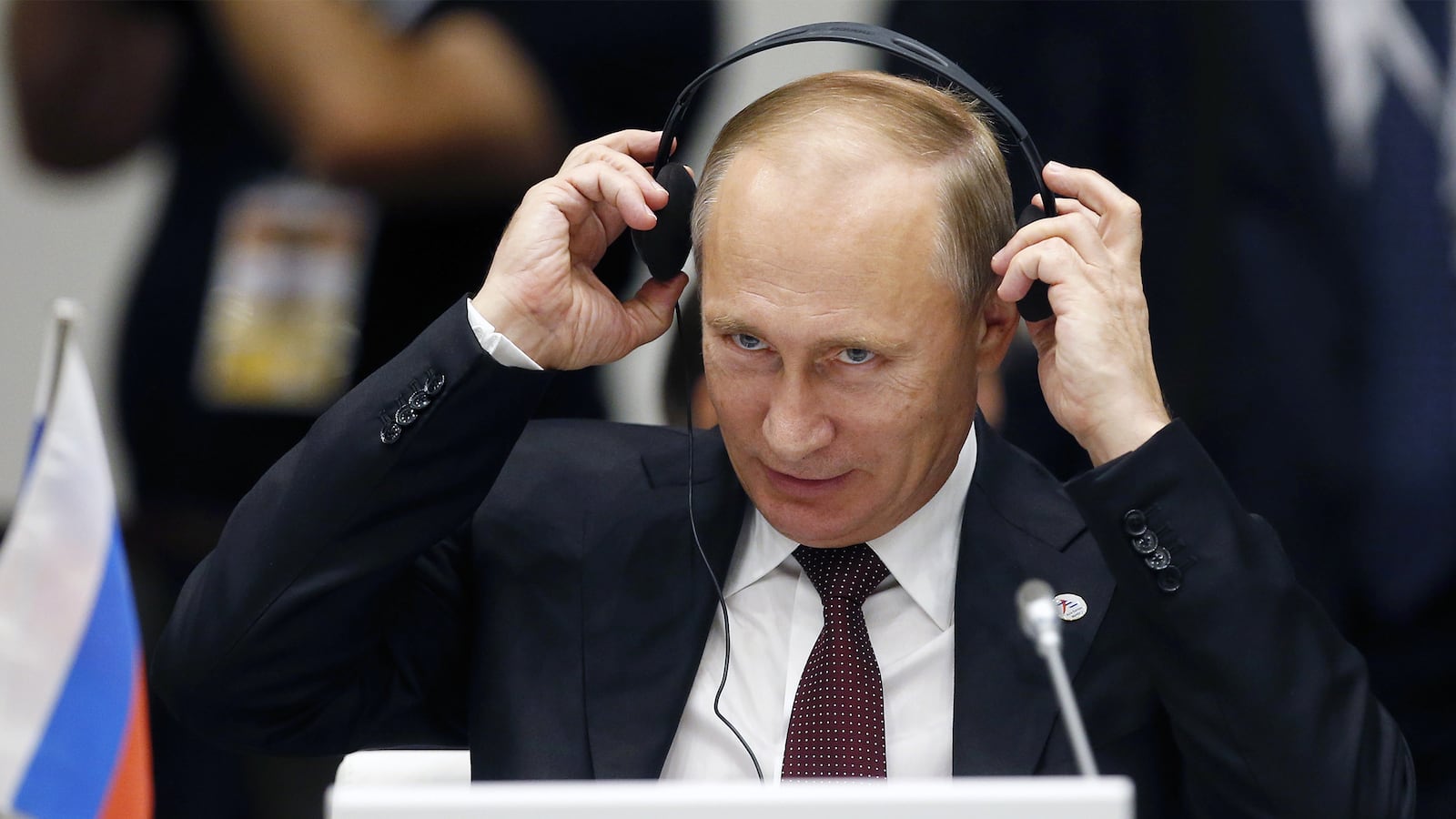The situation sounded ridiculous to the 89 journalists who work for Russia’s most famous independent radio station, Echo of Moscow, and to many of its 7 million listeners across the country. Circumventing Echo company policy and going over the editor in chief’s head, Gazprom-Media, the company’s main shareholder, fired one of Echo’s most respected hosts, Alexander Plyushchev, and ordered security not to let journalists into their office Friday morning.
What for? Officially for an “insensitive” tweet by Plyushchev earlier this week about the accidental death of the elder son of Sergei Ivanov, Putin’s chief of staff. Plyushchev later apologized and deleted the tweet. But Echo editor in chief Alexei Venediktov sees the incident as a pivotal incident in the “long-term war” the Kremlin has fought against the radio station, he told The Daily Beast in an exclusive interview.
That war has been a long one. Venediktov has weathered many battles as Echo’s editor, and his own life has been threatened. One morning a few years ago, the editor left his apartment to find an ax stuck into a log on his doorstep. During the last few months of the Russia-Ukraine conflict, Venediktov and his colleagues have appeared on multiple black lists, labeled as “enemies of Russia,” “Russophobes,” and members of a “fifth column.”
But this time, Echo is coming under attack from all sides. “This war is being fought on all fields, starting in the Ministry of Natural Resources and ending with the prosecutors,” Venediktov said. It is clear to the veteran editor that if he lets the authorities fire his reporter today, tomorrow there will be no Echo of Moscow. So Venediktov has decided to take the “illegal attacks” on the station to court, though his chances of success are low. “Plyushchev’s case was a way to show us the mechanism for Echo’s destruction,” he said. “The order comes from the very top. The Kremlin is determined to eliminate Echo’s policy by dismissing me, the station’s editor in chief, and the core reporters.”
To the millions of Russians who listen to Echo both on the radio and online, the idea of life without Echo is unthinkable. Muscovites call their favorite station “Ukho Moskvy” (Ear of Moscow) and see it as an institution, a compass for society. Echo has documented all the crises of the post-Perestroika era, wars, conflicts, scandals, and protests. “In all our worst crises, politicians have always supported us, since they knew that once every door was closed to them, if they were blackmailed or discredited, Echo would always give them a chance to speak out, as our policy is not to participate in any media or political wars,” radio host Olga Bychkova told The Daily Beast on Friday.
Echo’s microphone has always been available to any top politician, from Prime Minister Dmitry Medvedev to Hillary Clinton; opposition leaders; social workers; and even random Russians, calling in to Echo’s live shows day and night. For Russians, losing Echo would be as painful as losing NPR would be for Americans or losing the BBC would be for Britons. But in Russia, there is no alternative to Echo.
Would the Kremlin and its supporters regret losing Echo? “I don’t think any Russian patriot will miss them,” said Yuri Krupnov, an analyst for a pro-Kremlin think tank and a blogger for Echo, said in an interview on Friday. “Echo has very professional journalists, but all of them have purely neoliberal views. We don’t need a radio station with an agenda.”
But is there any chance Russia will get an alternative to Echo, a stage for wide-ranging discussions? “No, there is no demand for professional journalism,” Krupnov said. “The team in power want to keep things as they are now.”
For over two decades, if you asked Russian politicians whether there was freedom of speech or democracy in Russia, the answer would be: “Yes, look, we have Echo of Moscow.” So what got the Kremlin so angry at Echo of Moscow this time? It may come down to Ukraine: On the Echo show With My Own Eyes on October 29, Sergei Loiko of the Los Angeles Times and Timur Olevsky of Rain TV described covering the battle for the Donetsk airport in eastern Ukraine. Two days later, for the first time in Echo’s 25-year history, the authorities presented the station with a written warning, with the Federal Service for Supervision of Communications accusing Echo of “extremism.”
The war against Echo has coincided with the rise of Russian nationalist and pro-Kremlin movements. Last weekend, on Russia’s Unity Day, about 60,000 demonstrators gathered in central Moscow, waving placards that said: “An Attack on Russia Is an Attack on Me.” A majority of Russians take the economic sanctions imposed by Europe and United States deeply personally, as an attack on Russia’s sovereign policy. The sanctions have consolidated Russian support for Vladimir Putin, pushing the president’s approval rating to 84 percent. Does Venediktov have any hope that Echo of Moscow will survive this battle? “I don’t think so,” he said. “Look outside your window. We are just a part of the landscape.”






